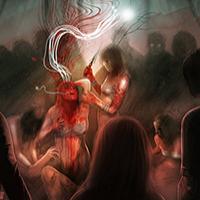Randomness vs. Constants
#21
31 January 2013 - 06:28 AM
A good example would be the DQ9 Legacy bosses. If they decide they want to use certain moves often or certain combinations of moves everyone just dies. If not, they're not that bad. Some of them are even soloable even at max level. Provided they don't spam those certain moves or move combinations.
RNG manipulation might be a skill but it's typically not one people think of when it comes to defeating difficult fights.
#22
07 February 2013 - 04:10 PM
 DrBretto, on 21 October 2012 - 09:03 AM, said:
DrBretto, on 21 October 2012 - 09:03 AM, said:
Without RNG, there is no risk/reward analysis beyond your first playthrough. Once you've learned and mastered the proper steps, you will succeed. There are quite a few games out there that were very successful without RNG, from a maze in a children's activity book to Mike Tyson's Punch Out! to those Sierra games with 37 floppy disks, IWTBTG, Contra, etc. There's still some fun factor to playing some of these games due to their difficulty (contra/punch out) but generally, these games can only be enjoyed when you've forgotten the patterns.
Chess/checkers/etc are notable exceptions in that the risk/reward assessment comes directly from your opponent's unpredictable human mind. The exact opposite is true of Poker, where the cards are (essentially) RNG based but you rely on your opponent's predictability and your own ability to assess risk to succeed.
FFT 1.3 has a wonderful balance. The RNG is featured here beautifully. Yes, you can chose to try to stone an enemy with 33% chance of success, or you can cut its HP in half with an 85% chance of success. If you chose the all-or-nothing route, you'd better have a backup plan in case it fails. In this case, the RNG simulates the human intelligence you would face in a game of chess. But there's still plenty of actual structure to it. There's a generally accepted way to beat the engineer fight in the colliery, for example.
Combining both fosters replayability. You will struggle a lot less on your second playthrough but there's still nothing predictable about the game, so you can continue to experiment and learn and find better ways of reaching your next goal.
Without a human opponent, no one would play FFT (1.3 or otherwise) for hundreds of hours without RNG. RNG is literally your friend. It simulates your human opponent.
I would disagree with "There are quite a few games out there that were very successful without RNG," but I could have misinterpreted what you said. Many games are successful without RNG, namely the competitive RTS, FPS scene (lacking "game play effecting" RNG).
I believe that it hurts a game (mainly competitive games) to have an RNG system. League of legends is a MOBA with RNG, which I think is terrible in a player vs player standpoint.
#23
07 February 2013 - 04:13 PM
 FFTA, on 07 February 2013 - 04:10 PM, said:
FFTA, on 07 February 2013 - 04:10 PM, said:
Any game with variable damage or an evade/hit system that isn't completely based in hitboxes has an RNG. That's a pretty large number; the trick is balancing the RNG with player skill.
#24
08 February 2013 - 12:34 PM
Quote
Imo any game that features a human opponent should have effectively zero RNG.
Exceptions to this are the nintendo party games like Mario Kart (lower position = better item) or Smash Bros (the items are not only toggleable, but free-for-all).
Board games like Monopoly or Clue would be better without the dice mechanic and instead have a bank/hand of movement options to be selected from. Snakes and Ladders, Trouble, Life, and Candyland can all die in a fire. Parcheesi gets a pass with the kill and blocking mechanics in place. Settlers of Catan gets lumped into the same group as Parcheesi, though.
#25
08 February 2013 - 12:43 PM
 philsov, on 08 February 2013 - 12:34 PM, said:
philsov, on 08 February 2013 - 12:34 PM, said:
Exceptions to this are the nintendo party games like Mario Kart (lower position = better item) or Smash Bros (the items are not only toggleable, but free-for-all).
Board games like Monopoly or Clue would be better without the dice mechanic and instead have a bank/hand of movement options to be selected from. Snakes and Ladders, Trouble, Life, and Candyland can all die in a fire.
Fair enough, but I was talking more along the lines of actual video games. Now, I know that's a bit vague, so I'll break it down and say that when I was typing that post, I was mostly thinking of MMO PvP, not most FPS or.. "fluff" games I suppose you could call them, like Mario Kart, or maybe Super Smash Bros.
I might have been using RNG as a synonym for a luck component of some kind, because in that setting I believe that's what it boils down to in some way. Balancing the RNG in the way I was saying really just means making it so that it's not heavily luck based, but enough so that from time to time you can get surprised when something misses, or some batshit crazy stuff happens that noone's expecting.
#26
08 February 2013 - 12:52 PM
Quote
And I don't see how either of those is the superior option to consistency and reliability. Your opponent should already be sufficiently random that one doesn't need the game to throw additional wrenches at both of them. The RNG should act as an equalizer, and equalizers have no place multiplayer competitive games. Using the RNG as an enhancer usually reduces the game/competition to "hold the line, wait for RNG windfall, then push".
Which... objectively sucks, but is pretty sweet when you're a warrior/shaman duo in Burning Crusade and your team get a combination windfury/sword proc and literally one-shot the other guy. Haha, silly healer. Good luck healing against that.
#27
08 February 2013 - 12:59 PM
 philsov, on 08 February 2013 - 12:52 PM, said:
philsov, on 08 February 2013 - 12:52 PM, said:
Which... objectively sucks, but is pretty sweet when you're a warrior/shaman duo in Burning Crusade and your team get a combination windfury/sword proc and literally one-shot the other guy. Haha, silly healer. Good luck healing against that.
I suppose you have a point there, but I wasn't talking about RNG windfall, more like evade, hit chance, criticals, etc. In the World of Warcraft example, I suppose "windfall," if I'm understanding you correctly, would be the equivalent of waiting for your offensive cooldowns to come off CD so you can put the pressure on the other team.
In something like a FPS or a fighting game where you're using cover/moving around, that's different. I'm talking more along the lines of something similar to WoW's battle system where it's not as dynamic as that (sans AoE), or maybe the traditional RPG would be a better example.
#28
08 February 2013 - 01:34 PM
Quote
That's more like the push afterwards. CDs are something the player times, activates, and then waits for them to again come back off cooldown. Having your two-handed sword hit 4 times simultaneously due to RNG (from buffs and talent spec) is a windfall.
#29
08 February 2013 - 01:53 PM
 philsov, on 08 February 2013 - 01:34 PM, said:
philsov, on 08 February 2013 - 01:34 PM, said:
Oh, that's what you meant. Yeah, I definitely agree with you there; that's pretty stupid to just wait for that. Why even have PvP then?

















